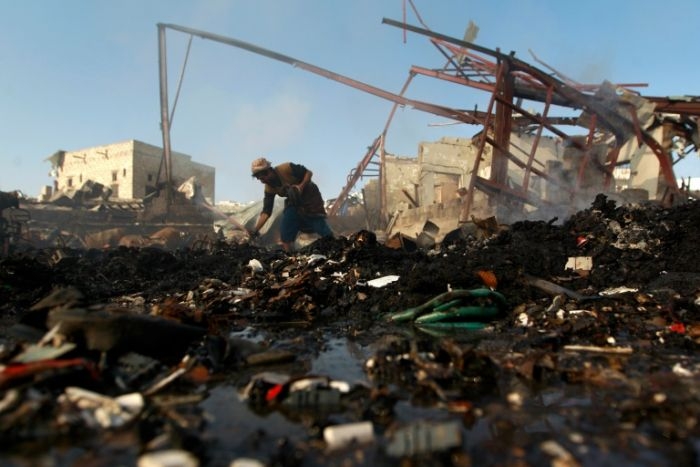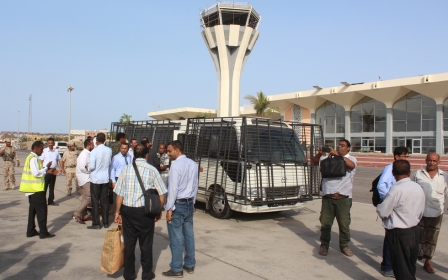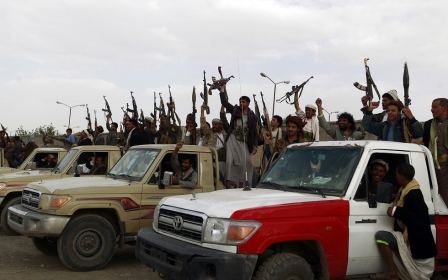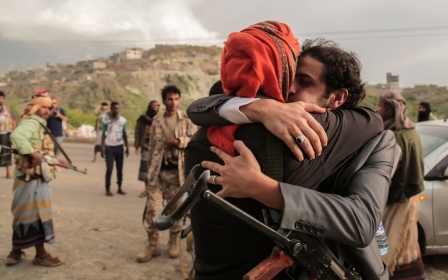Saudi coalition deliberately hit key industrial targets in Yemen: HRW

The Saudi-led coalition unlawfully bombed factories, warehouses, farms and power plants during its air campaign in Yemen, intentionally damaging the country's long-term future, according to a report published by Human Rights Watch (HRW).
The 59-page report claims that 130 civilians were killed and 171 injured in 17 coalition air strikes that specifically targeted 13 sites critical to Yemen's economy, attacks which the organisation said could be war crimes.
Remnants of US and UK manufactured munitions, including one UK manufactured guided munition produced in May 2015 after the start of the Saudi-led aerial campaign, were found at several of the sites that HRW investigated.
More than 2,500 people were employed at the various sites and after the attacks, hundreds of workers lost their livelihoods, the report said.
"The repeated coalition air strikes on civilian factories appear intended to damage Yemen's shattered economy long into the future," said Priyanka Motaparthy, senior emergencies researcher at HRW, who wrote the report.
"Saudi Arabia and other coalition members have shown no interest in investigating unlawful attacks, or even compensating the victims for lives and property lost," said Motaparthy.
The Saudi-led coalition, which includes Bahrain, Qatar, the United Arab Emirates, Egypt, Jordan, Morocco and Sudan and also receives US assistance, began an aerial campaign against Houthi and allied forces in Yemen in March 2015.
Since then, more than 6,500 people, half of them civilians, have been killed. In March, the UN accused the coalition of causing twice as many civilian casualties as other parties to the conflict and condemned the coalition for failing to prevent deadly incidents.
Saudi Arabia, however, has denied causing civilian deaths on a large scale and says it had made efforts to avoid civilian targets.
In the report, HRW calls for the coalition members to agree to an independent international inquiry into the allegations.
On 10 April, parties in the conflict declared a cessation of hostilities and began peace talks in Kuwait later that month. The level of violence in the country diminished after the ceasefire went into effect, but air strikes and fighting on the ground have continued.
The air strikes, said HRW, have compounded an already bleak situation in which more than 80 percent of Yemen's population requires some form of humanitarian assistance.
UN Secretary-General Ban Ki-Moon warned in late June that the Yemeni economy "is in a precarious condition," pointing to an "alarming scarcity of basic food items" in Yemen.
Human Rights Watch and other rights groups have called for foreign governments to halt sales and transfers of all weapons and military-related equipment to parties to the conflict in Yemen.
Earlier this year, the rights group also called on Saudi Arabia to be suspended from the UN Human Rights Council in a letter sent to the international body in light of the kingdom's conduct in Yemen.
The letter signed by Human Rights Watch and Amnesty International claimed that Saudi Arabia had used its membership of the body to obscure human rights violations committed during its war in Yemen.
Leaked documents released by Wikileaks claimed that Britain and Saudi had made a "secret deal" to ensure both states could be elected to the UN's influential body.
Saudi Arabia's election to the council in 2013 sparked an international outcry over the Gulf state's human rights record.
In the past, the UN rights body has criticised Saudi Arabia for its human rights record in its annual report.
This article is available in French on Middle East Eye French edition.
Middle East Eye propose une couverture et une analyse indépendantes et incomparables du Moyen-Orient, de l’Afrique du Nord et d’autres régions du monde. Pour en savoir plus sur la reprise de ce contenu et les frais qui s’appliquent, veuillez remplir ce formulaire [en anglais]. Pour en savoir plus sur MEE, cliquez ici [en anglais].




